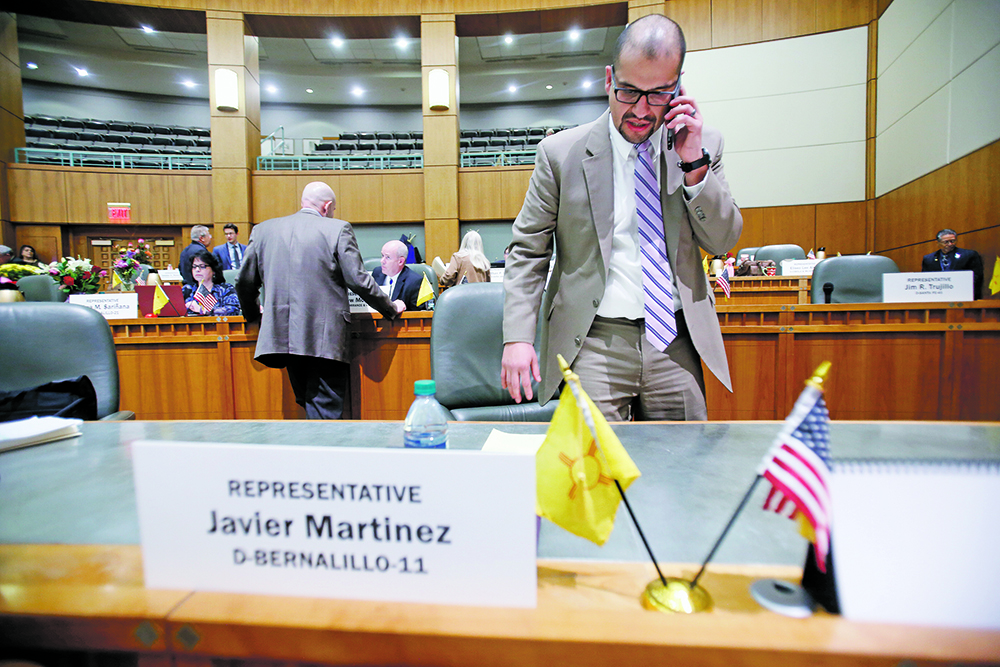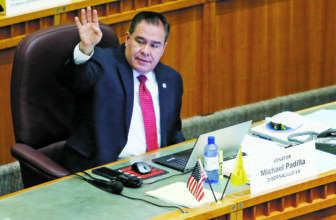
Luis Sánchez Saturno/New Mexican file photo
Rep. Javier Martinez makes a call during a previous session of the New Mexico Legislature.
SANTA FE, N.M. — It was a week into the 2020 New Mexico Legislature, and a group of former state foster youth had assembled by the door of the Senate Chamber at the Roundhouse. The young adults, some dressed in business clothes, were at the New Mexico State Capitol on their own dime to lobby for foster care improvements.
Some of them chased their own toddlers, who were stumbling and falling while running around the public area outside the Senate Chamber. Whenever the door to the auditorium swung open, the booming voices of state lawmakers echoed through the PA speakers and into the waiting area, drowning out the laughter of the kids and their young parents.
Marco Martinez of Albuquerque, N.M., was one of the aged-out foster youth. During previous legislative sessions, he helped open the eyes of lawmakers as a national youth advocate for the Annie E. Casey Foundation, he said. He’s also a New Mexico youth advocate with the Albuquerque-based foster care empowerment nonprofit NMCAN, which has crafted foster youth-focused policy blueprints for legislators.
Despite a handful of reforms to the state’s foster care system over the past few legislative sessions, Martinez said New Mexico is still in catch-up mode.
“We were talking on the way here that all of these things that we’re trying to get lawmakers to pass should’ve already been in place,” said Martinez, 26, who spent a significant portion of his teenage years in foster care in Bernalillo and Valencia counties. “To make the adults realize that is like running into a wall sometimes.”
During the 2020 Legislature, state elected officials, buttressed by record-shattering oil and gas revenue in southeastern New Mexico, approved a number of laws expected to help better the lives of youth in care and the state’s fraught foster care and child welfare systems.

Ezra Spitzer
Lawmakers made headway to improve conditions for state foster youth compared to past sessions, but they could have and need to do more, said Ezra Spitzer, executive director of NMCAN.
“I think the 2020 session was positive, but incremental for foster youth. … There were some good refinements and some additional tools put into law that should help with creating more equitable opportunities for young people,” he said. “There were also some missed opportunities and there is a lot more work to be done to create systems that truly value and work for young people and their families.”
‘Authentic partnership’ needed
Martinez said that another challenge for him and his fellow youth advocates is getting lawmakers to take them seriously. It’s partially due to a stereotype that some foster youth, especially teens, are dangerous and emotionally unstable, he said, instead of good-hearted kids who are trying their best to overcome their trauma — and often without professional behavioral health counseling because New Mexico lacks even such basic services.
More often than not, he said, government policies don’t directly assist youth in care, which can inflame feelings of alienation and cause foster youth to “act out,” which deepens the stigma that foster youth are hopeless and unhinged. “You become the rebel as a young person, and they add more to your file and the binder that follows you,” he said.
[Related: Las Cruces, New Mexico, Legislator Helping Fight Childhood Trauma]
[Related: Fewer New Mexico Detention Centers Means Problems For Families, Staff]
[Related: N.M. Legislature Also Worked on Intersecting Foster Care Issues]
[Related: Occupancy Tax Has Potential to Help New Mexican Kids, CYFD Expert Says]
“To make a better system is to have authentic youth-adult partnership,” Martinez said. “Have young people at the table. Listen to what they have to say and get rid of that idea of, ‘They don’t know what they’re talking about.’ A lot of times the young people have matured more than some adults that we work with.”
Winners and compromises

Luis Sánchez Saturno/The New Mexican
Sen. Michael Padilla
A pair of foster care bills sponsored by Sen. Linda Lopez, a Democrat, that subsidize guardianships and school credit for transfer students were signed into law by Gov. Michelle Lujan Grisham on Friday. Democratic Sen. Michael Padilla, who spent his youth in the state’s foster care system, also helped green-light crucial financial support for youth in care who are matriculating into adulthood. That bill was also signed into law Friday.
But critics say that lawmakers, who allowed a tax credit for foster youth employment to stall in committee, balked at directing even more state revenue to New Mexico’s endangered youth and families. Child welfare professionals as well as some legislators view New Mexico’s well-documented struggles — near or at the bottom of the country in measures like child poverty and educational proficiencies — as a public health crisis.
Fiscally conservative legislators argued with progressive lawmakers during the session, saying the state needs to diversify and tamp down its spending portfolio in order to soften the blow from the inevitable oil bust cycle.
The 2020 Legislature, like every even-year legislative session in New Mexico, was a full sprint to the finish. (The Legislature meets for a 60-day regular session in odd-numbered years.) The flashy agenda items were a red flag gun control law (it passed), recreational marijuana legalization (it failed) and a tuition-free college plan (which was funded but by a significantly reduced amount).
But the primary focus of the session was debating a new general appropriation budget that’s awash with record dollars. The oil manufacturing windfall in the Permian Basin equated to $797 million in new money for the state, according to a December 2019 New Mexico Legislative Finance Committee report.
Despite the largess, Sen. John Arthur Smith, chair of the Senate Finance Committee, limited state spending, as he has in past sessions with the panel’s help. After a testy dust-up between lawmakers, Smith, a longtime moderate Democrat who former Gov. Bill Richardson nicknamed “Dr. No,” amended a budget bill crafted by the Democrat-controlled House of Representatives.
“The House side overloaded that bill with spending [$150 million] too much in excess of what was prudent,” Smith said. He trimmed proposed expenditures, including money for road repairs and teachers’ salaries.
New department, trust fund
Despite the conservative spending plan, Lujan Grisham, who is expected to sign the revised $7.6 billion budget bill, called the session an “A-plus” for children up to age 5, especially those born into low-income families.
The spending act, House Bill 2, routes a one-time appropriation of $320 million to a new Early Childhood Trust Fund. That will finance early childhood programs for the new Early Childhood Education and Care Department, which was created during the 2019 Legislature in response to New Mexico’s dismal foster care and child well-being outcomes.
The trust fund, which will also underwrite child protective services and counseling managed by the New Mexico Children, Youth and Families Department (CYFD), will receive yearly monies from a variety of oil and gas revenue sources until the trust reaches at least $1 billion. Democratic Rep. Javier Martinez said the fund is a proactive big deal to guide vulnerable children and families onto a healthy life and educational path, and away from foster care and juvenile incarceration.
Though the state will spend hundreds of millions of new money to try to reverse its history of poor performance in child well-being, some lawmakers said that even more funding could have been allocated.
HB 83, which created the Early Childhood Trust Fund, was viewed as a compromise to passing a prospective constitutional amendment. That proposal, which has been in front of the Legislature for a decade, would earmark additional distributions (pending voter approval) from the state’s $19.7 billion Land Grant Permanent Fund for early childhood programs.
At the last minute, House Joint Resolution 1, which originally sought an additional 1 percentage point withdrawal from the investment fund (from 5% to 6%), was amended to half a percent more, or $76 million annually. The resolution, co-sponsored by Martinez and Democratic Rep. Antonio Maestas, wilted in the Smith-led Senate Finance Committee.
Padilla’s Foster Youth Changes Act, Senate Bill 168, aligns New Mexico with the federal Fostering Connections to Success and Increasing Adoptions Act and triggers approximately $2.3 million in existing federal funding. The aid package is accessible through CYFD for foster youth ages 18 to 21 who need financial help as they transition out of care. During the 2019 session, Padilla and Sen. Candance Gould, a Republican, crafted a bill signed into law that extended foster care service eligibility from age 18 to 21.
Like SB 168, Lopez’s School Credit for Transfer Students Act received unanimous support from both chambers. SB 130 gives students in foster care partial earned credits when they’re forced to transfer to another public school due to a foster home move. Foster youth advocates said the lack of transfer credits has been a huge issue, forcing some students to repeat entire academic years or drop out of school entirely. (Youth advocates said a partial credits bill passed in 2019, but another piece of legislation created a technicality that prevented the law from going into effect.)
Lopez and Rep. Susan Herrera, a Democrat, advanced the Subsidized Guardianships Act that aligns with CYFD’s recent push to place more foster youth with extended family, such as grandparents or other siblings, or fictive kin, non-blood-related caregivers who have become like family members. Lopez said that SB 146 closes a loophole created by “outdated federal law” that prevents approximately half of kinship guardians from receiving CYFD financial support. She said the new law can prevent unnecessary removals from the home and limit traumatic placements in traditional foster care.
“This fix finally recognizes the additional needs and supports that families caring for children need and deserve. It’s such a positive and important step forward in keeping families together, while being supported, acknowledged and provided adequate resources,” said Maralyn Beck, founder of the Albuquerque-based New Mexico Child First Network and a volunteer foster parent. “This possibly is the greatest and one of most important bills our Legislature passed in 2020 to improve the state of child welfare in New Mexico.”
Losses
Advocates for youth in care were disappointed that SB 206, the Foster Youth Employment Tax Credit Act, didn’t make it out of the Senate Finance Committee. The proposed legislation, co-sponsored by Gould and Democratic Sen. George Muñoz, would have given employers a $5,000 monetary incentive for hiring current and former foster youth. The current 2018 state law, which was the first of its kind in the country, provides businesses with a $1,000 tax credit for employing youth in care, and, in turn, allows a foster youth to more easily transition to adulthood by securing steady employment. New Mexico’s example has led to a push to pass a similar measure at the federal level.

Kelly Fajardo
The Child Welfare Ombudsman Act, HB 213, also perished during the session. Republican Rep. Kelly Fajardo co-sponsored the bill, which recommended the creation of an ombudsman position who would investigate grievances against anyone involved with CYFD in a confidential manner. This could include foster youth, birth parent, social worker, foster parent or court-appointed special advocate.
“One of the biggest problems is CYFD regulates and investigates themselves. All checks and balances are within CYFD,” Fajardo said. Up to 30 states have some version of independent oversight for their child protective services division, she said. She plans to give the bill another shot during the 2021 Legislature.
“I had a phone call recently about a woman [at CYFD] who filed a complaint against her supervisor, and do you know who investigated the complaint? The supervisor,” Fajardo said. “That should never ever happen in anybody’s world.”
The Future
In upcoming legislative sessions, Jesús, another former youth in care who trekked to Santa Fe to chat with lawmakers, said he’d like legislators to craft bills that can succor youth in juvenile justice services (which CYFD also administers) and young people who are homeless.
“Before the current climate of advocacy, a lot of bills were specifically directed towards foster kids but now there’s more intention and discussion about giving equal rights and opportunities to youth that are in the juvenile justice system and youth who are homeless,” said Jesús, 24, who declined to share his last name for personal reasons
An Albuquerque resident, he can speak from experience. He was first placed in CYFD custody at age 5 and then adopted when he was 10. At 16, he landed back in state care, this time in the juvenile justice system. From there, he went to a residential treatment facility and then treatment foster care before becoming homeless.
Eventually, he landed a scholarship and found his own place to live. In 2019, he earned a bachelor’s degree in psychology and philosophy from The University of New Mexico in Albuquerque.
Today, Jesús has become a spokesperson for New Mexico’s at-risk youth. He’s taking his position so seriously that instead of going to graduate school, he’s advocating for youth in care on a full-time basis. He said it’s the least he can do.
“The decisions I make now will help impact and improve the lives of youth so that they don’t have to fall into the same cracks as I did,” Jesús said. “While it was superchallenging and at times incredibly stressful to be a foster youth, I’m grateful for it.”
This story is part of a Youth Today project on foster care in New Mexico. It’s made possible in part by the May and Stanley Smith Charitable Trust. Youth Today is solely responsible for the content and maintains editorial independence.































